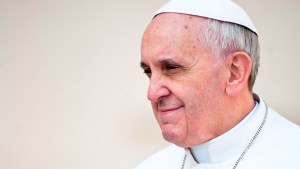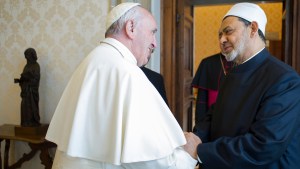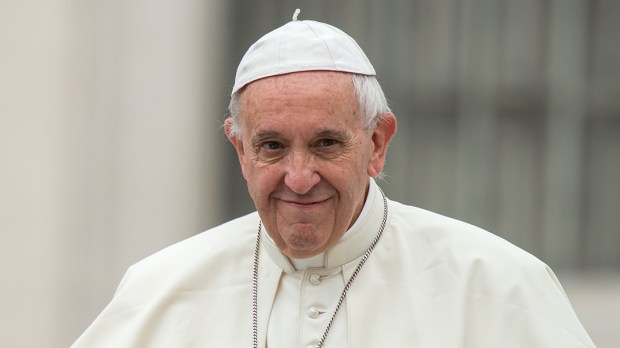Here is another selection of excerpts from Politics and Society, a new book-length interview with Pope Francis, in which the pope deals with some of the hot-button issues of our day.
Pope Francis sat down for 20 conversations with French journalist Dominique Wolton for a book-length interview that will be released in French on Wednesday. The 432-page volume is titled Politique et société: un dialogue inédit, or Politics and Society: Conversations with Dominique Wolton.
Wolton conducted the interview sessions over the span of two years, the first time that the pope has given such a lengthy amount of time to a project like this.
Wolton is a sociologist and the director of France’s National Institute of Communication Science (l’Institut des sciences de la communication), known for a book-length interview with the former archbishop of Paris, Jean-Marie Lustiger.
The French periodical Le Figaro has published some excerpts of the book; Aleteia offers you a provisional translation of some of these.

Read more:
Pope Francis on celibacy, child abusers, same-sex unions, secularism, and traditionalists

Read more:
Pope Francis: Historical-critical study of Quran would be helpful
Rigidity scares me
— Pope Francis: Behind any kind of rigidity, there is an inability to communicate … Think of rigid priests who are afraid of communication, think of rigid politicians … It’s a form of fundamentalism. When I meet a rigid person, especially when it is a young person, I immediately think to myself that he or she is ill. The danger is that they are looking for security. In this context, let me tell you a story.
When I was novice master in 1972, we gave guidance and direction to candidates who wanted to join the Society of Jesus (the pope’s religious order —Ed) for one or two years […]
I remember one of them, who seemed to us a bit rigid, but who had incredible intellectual gifts, and who I thought was very talented. There were others who were much less brilliant and I wondered if they would manage to pass the [psychological] evaluation [to enter the Society]. I figured they would be refused, because they had struggles. In the end, they were admitted, because they had the capacity to grow, to achieve [the formation goals]. And when the first student arrived to the evaluation, they said “no” immediately.
“But why? He’s intelligent. He’s got a lot of good qualities.”
“He’s got a problem,” they explained to me. “He’s a bit inflexible, somewhat artificial in regard to certain issues, somewhat rigid.”
“And why is he like that?”
“Because he’s not sure of himself. You get the impression that these men subconsciously perceive that they are ‘psychologically ill.’ They don’t know it, but they feel it. Thus, they go in search of strong structures to defend them in their lives. They become policemen, they enlist in the army or the Church. Strong institutions to defend them. They do their work well, but once they feel secure, subconsciously, their illness manifests itself. The problems begin.”
And I asked, “But Doctor, how do you explain this? I don’t understand it well.”
He answered me:
“Have you never asked yourself why there are policemen who torture? These young men, when they arrived, were good kids, but ill. Afterward, they felt sure of themselves, and the illness manifested itself.”
Rigidity scares me. I prefer a disorderly young person, with normal problems, who gets angry … because all of these contradictions will help him to grow.
The Church is the People, not the bishops, the pope, the priests.
—Pope Francis: There are sins committed by Church leaders against those who are less intelligent, or those who are more easily manipulated. But the Church is not the bishops, the pope, the priests. The Church is the People. Vatican II said, “The People of God, in its totality, does not err.”
If you want to see the Church, go to a town where the life of the Church is lived. Go to a hospital where there are Christians who help — laypeople, women religious … Go to Africa, where you find so many missionaries. They give their lives there. And they bring about authentic revolutions. Not to obtain conversions — conversion was the term in different times — but to serve.
What most impresses me about the Church is its ordinary, fruitful sanctity.
— Pope Francis: There is a great deal of holiness. It is a word that I want to use in the Church of today, but in the sense of everyday holiness, in families … And this is my personal experience. When I speak of this ordinary holiness — I called it once “middle class” holiness — do you know what I’m thinking about? The Angelus of Millet. That is the image that comes to mind. The simplicity of these two farmers who pray. A people that prays; a people that sins, and that repents of its sins.
There is a form of hidden holiness in the Church. There are heroes who go off as missionaries. You, the French, have done a lot. Some have sacrificed their lives. This is what most impresses me about the Church: its ordinary, fruitful holiness. This capacity to grow in holiness without making a big deal of it.
All priests can now give absolution for abortion
— Pope Francis: During the Jubilee of Mercy, I extended to all priests the power of absolving the sin of abortion. Now note, this does not imply a trivialization of abortion. Abortion is grave: It is a grave sin. It is the murder of the innocent. But if a sin has been committed, forgiveness must be made available. In the end, I decided that this measure would be permanent. Now every priest can absolve this sin.
Wolton — Your open and humane position meets with opposition in the Catholic Church.
— Think of a woman who has physical memory of her child, which oftentimes happens, and who cries, who cries for years without the courage to go to see a priest. Do you realize how many people can finally breathe?

